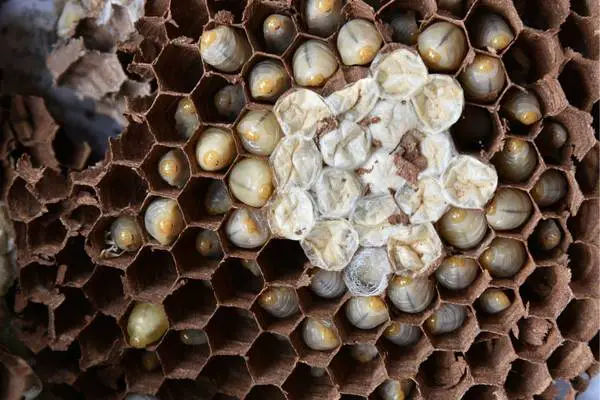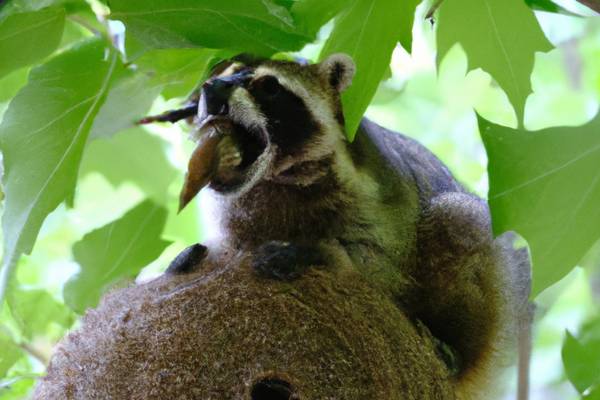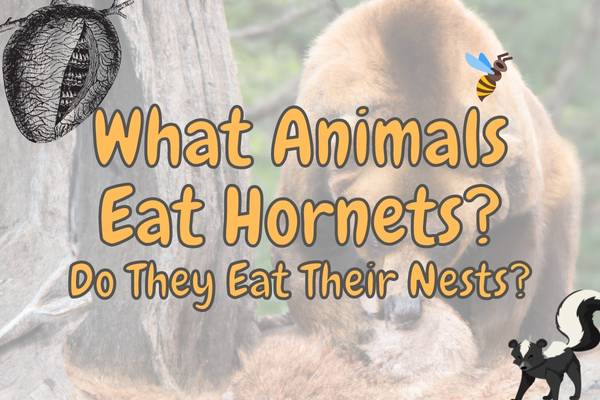Given the propensity for wasps and hornets to protect their nests, even to having lookouts keeping watch for potential threats, you might be surprised that any animals would even think about attacking them.
So, a variety of animals will actually eat hornets or raid their nests for larvae. This includes raccoons, skunks, birds, and even bears. Although they can be stung in the process, these animals seem to think that the stings are worth it for a good meal.
This is mainly because those tasty larvae inside sometimes prove to be irresistible to some animals. Usually, any animal that will attack a nest will also eat the adults as well. Victims include all sorts of wasps and hornets.
European hornets are active both day and night, which takes away the advantage of nocturnal animals preying on wasps and hornets that are half asleep. It also makes these insects harder for homeowners to eradicate.

This doesn’t deter the predators, however, making the European hornet just as much a target as the rest. Let’s take a look at which ones are brave enough to risk getting stung.
Contents
Does anything really eat hornets?
Yes! Many animals will eat hornets or their larvae.
Raccoons, skunks, birds, and even bears will also raid their nests for larvae. This includes raccoons, skunks, birds, and even bears.
Although they can be stung in the process, these animals will approach a hornet nest, but many other animals will eat individual hornets when they are away from the nest. These hornet eating animals include:
- The caracara Falcon
- Tanagers
- Purple Martins
- Other hornets
- Cannibalflies
- Badgers
- Black Bears
- Raccoons
- Larger lizards
- Hedgehogs
- Bullfrogs
- Larger carnivorous fish
- Velvet Ants
But let go into some of the more common ones that people ask about!
Do raccoons eat hornet nests?
They don’t actually eat the nests, but they have been known to sniff out yellow jackets’ underground nests. Since raccoons are largely nocturnal, they search out the yellow jackets’ nests at night, which works out well since the insects are usually less active then.

They actually eat the yellow jackets and not just the larvae. Since there can be thousands of insects in one nest, this can be quite a bonanza.
Of course, the hornets will try to sting the raccoons, but the thick fur keeps the stings from penetrating deeply enough to cause injury.
They can be stung around the eyes, nose, and mouth, but the raccoons persevere anyway.
Do skunks eat hornet nests?
Striped skunks, like raccoons, will search out and dig into yellow jacket nests during the night. They have very good claws for digging. In fact, the inner toes on their front paws are actually fused to facilitate digging. They eat both the adults and the larvae.
Some skunks will stir up a nest and swat any adults flying out, then eat them. They can actually catch the flying wasps in their tails and eat them during the day.
Skunks eat so many yellow jackets that they are considered to play a key role in keeping down yellow jacket populations.
They can be stung in the usual vulnerable places but seem to be either immune or highly resistant to the venom of the yellow jackets. Some skunks have been known to die from bee stings, however.
Do birds attack hornet nests?
A few birds will attack the nests, most notably the Caracara, also called the wasp-eating falcon. These birds live mostly in Central and South America, although one species’ range extends from parts of Central America northward to Texas, Louisiana and Florida.
These birds will actually grab hornet nests and bring them home to their chicks. The chicks’ diet can consist of up to 77% wasps.

A bird that preys on hornets that may be a surprise is the tiny black-capped chickadee. They actually eat wasps in large numbers. Mockingbirds will also prey on both the hornets themselves as well as the larvae. They frequently raid wasp and hornet nests for larvae.
Blackbirds and starlings also eat hornets and wasps and will look for and destroy a nest. They have been known to drag a wasp on the ground to remove the stinger. Blue jays also eat both the adults and larvae. With their powerful beaks, they can make short work of a nest.
Do bears eat hornet nests?
Bears are omnivores, meaning that they will eat almost anything. These include a surprising number of insects, including termites, bees, beetles, yellow jackets and other species of wasp and hornet.
They usually go for insects early in the spring, before plants mature with edible leaves or produce fruit such as berries. The thick fur that bears have repels most of the attempts of the hornets to sting, but they can be stung around the face, tongue and mouth. They seem to think that the stings are worth it.

Bears tend to remember good food sources, and once they’ve gotten into an insect nest, they may go back for seconds. Since there can be hundreds of insects in one nest and since larvae production is constantly going on, they can still get a good meal.
What other animals prey on hornets?
Some species of lizards, bats, badgers, hedgehogs, and even spiders will actually prey on the hornets themselves. Even thin-skinned amphibians such as frogs, salamanders and toads will eat a hornet or two. Even a turtle won’t turn one down. They will either feast on the insects themselves, or sometimes take a small nest home for the kids.
And then, well, some humans do:
Do not try to redo that though. I do not think the taste is worth it for us humans…
Decomposers
Whereas very few animals eat the hard wooden nest material itself (but rather the living larvae or insects inside), some living organisms prefer to eat the cellulose from which the nest is composed.
For example, termites will eat an abandoned hornet’s nest just for the wooden fibers they use to build their hive.
Certain worms or beetles like wood-boring beetles will also eat the wooden substances including wasps and hornet’s nests.
Other organisms will eat just about any organic matter that falls to the ground! These are the “decomposers” that lift the heaviest burden of the ecosystem – breaking down all the waste of other organisms.
Decomposers are mainly bacteria and fungi and these are found in the soil where the hornet’s nest will eventually end up! Especially certain fungi are quite happy with eating the cellulose that the nest is made from.
Conclusion
It may be surprising to learn that there are many animals that will eat hornets or their larvae. Although the hornets will try to sting their predators, many of them are immune or resistant to the venom.
Get Rid of Hornets Yourself

STEM Large Insect Spray
The Best Natural Hornet/Yellow Jacket Spray.
- Effectively kills hornets and yellow jackets
- Safe for people and pets
- Is based on natural ingredients
- Breaks down in nature
Some animals, such as raccoons, skunks, and bears, will actually seek out hornet nests to eat the insects. Birds and lizards will also eat hornets. These predators help to keep down the population of hornets, which keeps the ecosystem in balance.




